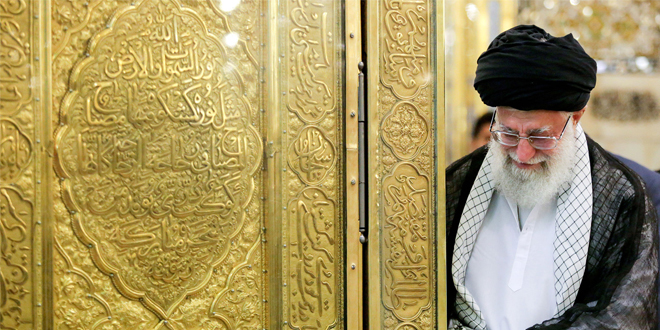
We begin tonight’s edition of A Window to the Fatherland with Dr. Alireza Nourizadeh reading one of his poems from the book of his collected works.
Dr. Alireza Nourizadeh:
We continue tonight’s program with looking at the latest comments by Ali Khamenei about the idea of a US-Iran negotiation, as well as his definition of anti-graft measures that he wants the Rouhani government to take.
In his speech on the country’s economic crisis he has said:
“Economic experts and many officials believe the cause of this problem is not foreign, it’s internal. Not that sanctions do not have any impact, but the major impact is related to performances of the government. If the actions by government officials are better, more prudent and timely andstronger, the sanctions will not have much effect.”
And on the issue of negotiating with the US he added:
“Why should we sit for negotiations with a bullying and cheating government?”
“We can only enter into the dangerous game of negotiating with America after we reach the economic and political and cultural power that we have in mind so that its pressures and puffery would not be able to affect us. However, at the present time, negotiations with the United States will be certainly to our detriment and is forbidden.”
As for the so-called anti-corruption policy of the Rouhani government, Khamenei said:
“Some are saying extreme things and claim that all are corrupt and use such descriptions as the existence of systematic corruption in the country; that’s not the case. True, even minor corruption is too much but extremism is wrong in all fields.”
Dr. Alireza Nourizadeh:
It is interesting and weird tonotice Khamenei’s morphing from a simple and needy mullah in the pre-revolution Iran into a man who gives himself the right to decide on behalf of 85 millions Iranians and tell his president that he is not allowed to negotiate with the US.
Actually, the US does not evenrecognise him and his position, in line with the desire of the majority of the Iranian people, who are these days on the streets of the country calling him a dictator and demanding and end to his tyrannical rule.
We continue the program with the news of the signing of a deal by the leaders of the five states bordering the resource-rich Caspian Sea on its legal status on Sunday in the Kazakh city of Aktau.
The leaders of Azerbaijan, Iran, Kazakhstan, Russia and Turkmenistan signed the agreement on the status of the inland sea, which has been disputed since the collapse of the Soviet Union rendered obsolete agreements between Tehran and Moscow.
Iran, who ended upwith the smallest share of the sea (less than 11%) under the terms of the convention, is viewed as a potential loser in the deal.
While Hassan Rouhani has called the convention “a major document”, Prince Reza Pahlavi, civil rights activist Heshmat Tabarzadi and Majles deputy Dr. Mahmoud Sadeghi have all warned that this document is nothing more than a capitulation of the regime to the Russians and their neo-colonialism.
At the end of the program we will discuss the cancellation of the Iraqi prime minister’s scheduled trip to Iran as he has now sided with the US to observe Washington’s sanctions against the Iranian regime.
 khalijefars News, Blogs, Art and Community
khalijefars News, Blogs, Art and Community








